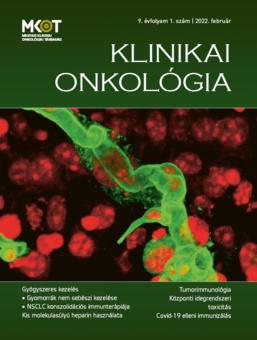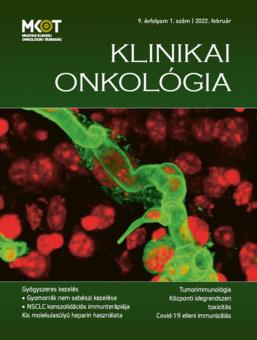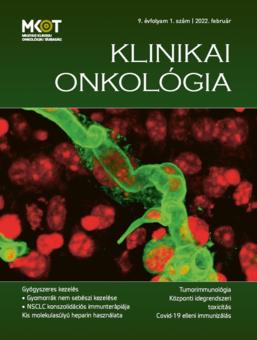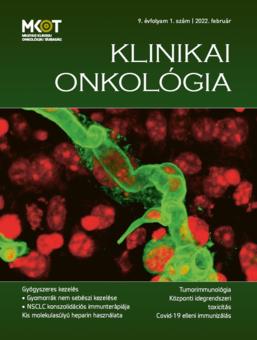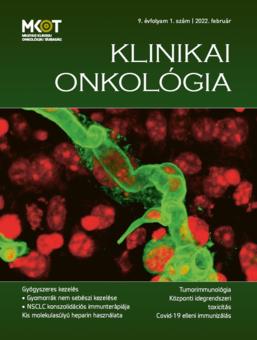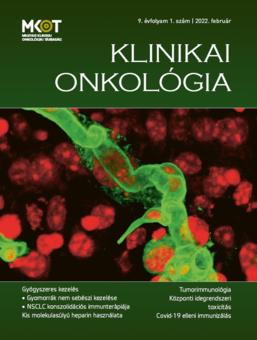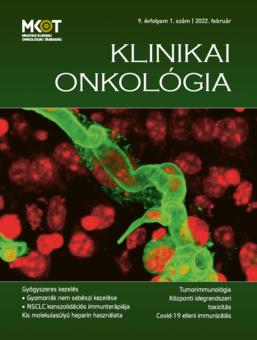The eLitMed.hu medical portal uses computer cookies for convenient operation. Detailed information can be found in the Cookie-policy.
Clinical Oncology - 2022;9(1)
Content
[Cogitation about the non-surgical treatment of gastric cancer patients]
[The causal and symptomatic treatment of patients with gastric cancer is an interdisciplinary task based on the recommendations of the oncoteam, meanwhile special attention must be paid to the patient's current condition. In Hungary, perioperative (neoadjuvant and adjuvant) chemotherapy, especially radiochemotherapy, are less common methods compare to their expected benefits. The best outcome in treatment of metastatic gastric cancer is expected in the frontline treatment, adding trastuzumab the case of HER2-positive, nivolumab or pembrolizumab for HER2-negative (and PD-L1-positive) to cytostatic therapy. The chemotherapeutic agents include various combinations of fluoropyrimidines cisplatin, carboplatin, off-label used oxaliplatin, and, as well as taxanes. Further options in second-line treatment include ramucirumab and trifluridine-tipiracil in third-line. The authors emphasize the importance of target-based therapy, which provided by the new generation sequencing (indicated in reasonable cases), and take into account tumor-agnostic treatment. They also recommended treatment for special clinical situations (tumor bleeding, peritoneal metastases, elderly, poor general condition). They emphasize that a careful symptomatic therapy should be encouraged not only in terminal cases but also right after existence of the diagnosis, and that in addition beside treating of somatic symptoms, the psychological and social factors must be taken into consideration as well, and also a proper communication with the patients and their families to prevent dissatisfaction in the future.]
[Consolidative immunotherapy of locally advanced non-small cell lung cancer]
[The standard of care management of locoregionally advanced, inoperable, stage-III non-small cell lung cancer (NSCLC) is the concurrent radiochemotherapy. Although the concurrent treatment increases the chance of five year survival with about 50% rate compared to sequential approach (10.6% versus 15.1%), the prognosis is still unfavourable. Impressive improvement in the treatment of metastatic NSCLC can be seen with the new immunotherapy era. Therefore the efficacy of the immuncheckpoint inhibitors are being investigated in earlier, potentially curable stages of the disease. Based on the results of the PACIFIC trial, high level of evidence supports the impact of consolidative immunotherapy on overall survival following concurrent radiochemotherapy. Several ongoing clinical trials focus on the efficacy of immunotherapies in such indication.]
[Immune responses to malignant tumors]
[The immune system recognises the tumour-specific antigens (TSAs) of malignant tumours that have mutated and destroys the transformed cells. The immune system, by its network nature, acts against tumour cells by several complementary mechanisms simultaneously. In addition to TSAs, cumulative mutations can also activate silent gene sequences encoding tissue hormones, growth and differentiation factors that are no longer relevant at a given age. These tumour-specific biomolecules are called tumour-associated antigens (TAAs), or tumour markers in clinical practice. The determination of TAAs aids differential diagnosis and monitoring of therapeutic efficacy, but is not suitable for mass screening because not all tumours express TAAs and they may be produced not only in tumour lesions but also in inflammatory conditions. Usually, after a prolonged period of equilibrium, when the immune system is no longer able to destroy all tumour cells – due to increased mutations – tumour cells may escape surveillance and develop into a malignant tumour causing clinical symptoms. The aim of immunotherapies is to use immune response mechanisms to re-sensitise the malignant tumour cells to the immune functions of the invading effector.]
[Central nervous system sideeffects of oncological treatments]
[Neurotoxicity due to chemotherapy and conventionally fractionated irradiation has been long recognized, but the exact pathomechanism of central nervous system damage caused by new therapeutic modalities, biological and immunotherapies, innovative local therapies, and new radiation techniques is currently not fully elucidated. The resulting neurological disorders can be spontaneously reversible or even fatal. The increasing basic research knowledge and clinical data provide an opportunity for better understanding of these lesions. Identification of risk factors, high-risk patients and symptoms, course monitoring, examinations, and differential diagnosis play important role in clinical decision. Despite the expansion of preventive measures and treatment methods, therapeutic options are limited, and often only discontinuation of antitumour therapy or dose reduction can help to prevent further neurological damage. The aim of this paper was to explore the central nervous system disorders resulting from various anticancer therapies, and to review their etiology, prognosis, and treatment options.]
[How can we immunize patients with malignant disease against Covid-19?]
[ All patients with active or prior malignant diseases should be fully vaccinated to prevent SARS-CoV-2 infection. Medical treatments may interfere with the efficient immune response, but vaccination is still recommended even in immunocompromised populations. People who undergo chemo-, or radiotherapy should be vaccinated between treatment cycles, when immunosuppression from treatment is minimized. For those who recovered from coronavirus disease or received Covid-19 vaccination prior to stem cell therapy, a repeated vaccination is recommended with a full primary series at least three months after the transplant. The measure of response to vaccination can be estimated on the basis of titre of neutralizing antibody level. Patients who can not be immunized by vaccines at all might benefit from plasma therapy or passive immunization with neutralizing monoclonal anti-SARS-2 antibodies.]
1.
Clinical Neuroscience
Is there any difference in mortality rates of atrial fibrillation detected before or after ischemic stroke?2.
Clinical Neuroscience
Factors influencing the level of stigma in Parkinson’s disease in western Turkey3.
Clinical Neuroscience
Neuropathic pain and mood disorders in earthquake survivors with peripheral nerve injuries4.
Journal of Nursing Theory and Practice
[Correlations of Sarcopenia, Frailty, Falls and Social Isolation – A Literature Review in the Light of Swedish Statistics]5.
Clinical Neuroscience
[Comparison of pain intensity measurements among patients with low-back pain]1.
Clinical Neuroscience Proceedings
[A Magyar Stroke Társaság XVIII. Kongresszusa és a Magyar Neuroszonológiai Társaság XV. Konferenciája. Absztraktfüzet]2.
3.
Journal of Nursing Theory and Practice
[A selection of the entries submitted to the literary contest "Honorable mission: the joys and challenges of our profession" ]4.
Journal of Nursing Theory and Practice
[End of Life and Palliative Care of Newborns in the Nursing Context]5.
Journal of Nursing Theory and Practice
[Aspects of Occupational Health Nursing for Incurable Patients ]